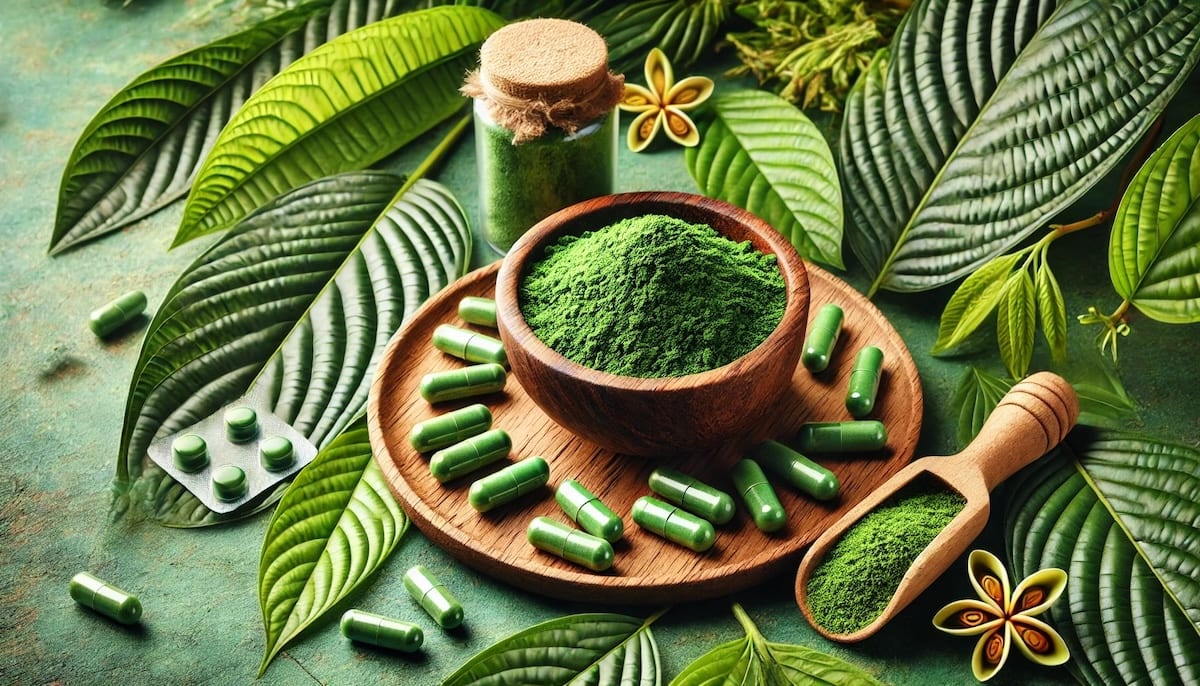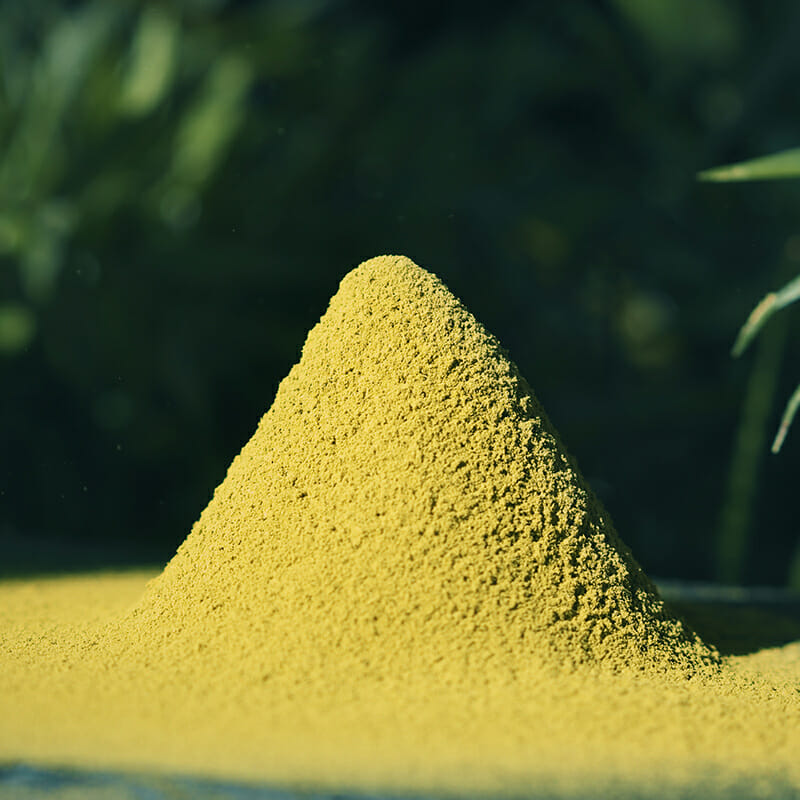If you’re considering adding Kratom powder to your daily regimen, you probably have a lot of questions. Kratom powder’s unsteady relationship with the FDA raises a lot of concerns for many consumers.
If you’re wondering, “Is Kratom legal in my state?” here is a run-down on Kratom and its legal status in the U.S.
What Is Kratom?
Kratom powder comes from a tropical evergreen tree – Mitragyna speciosa – that grows in Southeast Asia in countries like Borneo, Thailand, and Malaysia. It is from the same family as the coffee plant, and indigenous cultures have used it for centuries.
Westerners have recently discovered Kratom’s charms, and many people have adopted this natural botanical into their daily lifestyle. Depending on which strain you prefer, Kratom can promote peace and calm, or inspire motivation and optimism.
 In Southeast Asia, it is usually chewed in leaf form or brewed into tea. Many Westerners balk at the sharp, bitter taste of Kratom powder. To forego the taste, consumers blend powdered Kratom leaf into food or beverages.
In Southeast Asia, it is usually chewed in leaf form or brewed into tea. Many Westerners balk at the sharp, bitter taste of Kratom powder. To forego the taste, consumers blend powdered Kratom leaf into food or beverages.
They can also use the powder to make capsules, which are discreet and portable, and allow you to adjust your dosage to your needs.
The Active Ingredients in Kratom
Kratom is full of alkaloids, which are naturally-occurring compounds found mostly in flowering plants. The two active ingredients in Kratom are mitragynine and 7-hydroxymitragynine (7-HMG).
Beyond knowing what’s in the Kratom leaves that makes them so tremendously beneficial, it’s crucial, as with any new addition to your lifestyle, to understand Kratom powder’s legal status.
Kratom Consumer Protection Act
Because there is not much clinical research on Kratom, there’s a lot of misinformation. The research that exists is quite recent, dating back to only 2012.
In 2016, the Drug Enforcement Agency tried to advance an emergency classification of Kratom as a Schedule 1 drug due to its ability to bind with mu-opioid receptors in human brains.
There was an immediate backlash from the Kratom community. People publicly protested, signed petitions, and asked Congress to overrule the emergency scheduling. As a result, the DEA withdrew its claims, an unprecedented reversal. The tens of thousands of comments in support of Kratom, along with the Dear Colleague letters sent from the House of Representatives, were likely the cause of this turnaround.
 The DEA then decided to spend more time and effort researching the benefits and potential downfalls of Kratom use. The DEA has yet to publish a decision based on its findings, which means each state makes its own decisions regarding the legality of Kratom.
The DEA then decided to spend more time and effort researching the benefits and potential downfalls of Kratom use. The DEA has yet to publish a decision based on its findings, which means each state makes its own decisions regarding the legality of Kratom.
The Kratom Consumer Protections Act, or KPCA, aims to protect Kratom consumers and their right to buy Kratom legally. It also helps ban sales of impure or dangerous products. Unsafe and unregulated Kratom is the cause of confusion and mistrust regarding Kratom.
To confirm that the product you’re buying is 100% legal, check the American Kratom Association’s website for any new developments in your state.
Legal Status of Kratom in the U.S.
The DEA has yet to publish a definitive Kratom report, and the supplement’s future status is nebulous at best. Kratom is still legal in the United States, but some states have banned Kratom.
Here’s a comprehensive list of Kratom’s status in each U.S. state if you’ve been wondering, “Is Kratom legal where I live?”
Where Kratom Is Legal
- Alaska – Kratom is legal in Alaska, and people can buy Kratom powder in tobacco shops in major cities. Since Alaska is so huge, the best way for Kratom users to procure Kratom powder in Alaska is online.
- Arizona – Kratom is legal in Arizona. In 2019, this state passed a bill that aims to regulate the use and sale of Kratom.
- California – Kratom is legal, except for San Diego city and Oceanside. Kratom is legal in San Diego County, but not within the city limits.
- Colorado – Kratom is legal in this state but not in the city of Denver. Kratom that is bought and sold in Colorado is not labeled for human consumption.
- Connecticut – Kratom is legal in Connecticut. You can buy Kratom in tobacco shops or online.
- Delaware – Kratom is legal. There is no overt intention to criminalize Kratom in this state.
- Florida – Kratom is legal, except in Sarasota County.
- Georgia – Kratom is legal, but you must be over the age of 18. In 2018, the Senate unanimously voted to pass its version of the Kratom Consumer Protection Act. This act prohibits selling Kratom to minors and requires labels and disclaimers.
- Hawaii – Kratom is legal in this state. There is a bill in the works that may classify Kratom’s alkaloids as Schedule V substances. As of yet, it has not passed.
- Idaho – Kratom is legal in this state. The Idaho Office of Drug Policy has a warning on its website, but there are no attempts to ban Kratom in Idaho.
- Illinois – Kratom is legal in this state except for the cities of Alton, Edwardsville, Glen Carbon, and Jerseyville. It is illegal for minors under 18. A bill hoping to ban Kratom died in early 2019. Two more bills were introduced in February 2020 – one to ban Kratom and one to regulate it.
- Iowa – Kratom is legal in Iowa. There was a bill to ban it, but the fervor and support of the Iowan Kratom community killed it.
- Kansas – Kratom is legal in Kansas. The state is currently reviewing the Kratom Consumer Protection Act.
- Kentucky – Kratom is legal in this state. There have been a few unsuccessful bids to ban it, each eliminated due to Kratom supporters’ activism.
- Louisiana – Kratom is legal in Louisiana. Recently, this state passed a bill to look into Kratom more fully.
- Maine – Kratom is legal in Maine. In 2017, legislators put forth a bill defining Kratom as a Schedule W drug, a classification reserved for hallucinogens like methamphetamines. Kratom was removed before it passed.
- Maryland – Kratom is legal. However, there are some bills pending that hope to ban it.
- Massachusetts – Kratom is legal, and there have been no attempts to ban it.
- Michigan – Kratom is legal, and there have been no attempts to ban it.
- Minnesota – Kratom is legal, and there have been no attempts to ban it.
- Mississippi – Yes and no. Kratom is legal in the state; however, over 30 counties and cities have banned it.
- Missouri – Kratom is legal. Two bills are pending, one hoping to ban Kratom and the other hoping to regulate it.
- Montana – Kratom is legal, and there have been no attempts to ban it.
- Nebraska – Kratom is legal, and there have been no attempts to ban it.
- Nevada – Kratom is legal and regulated, by the KPCA, to ban sales to minors and require labeling and disclaimers.
- New Hampshire – Kratom is legal, except for Franklin City. There has been a ban in the works since February 2020.
- New Jersey – Kratom is legal. A new bill was introduced in January 2020 to ban Kratom in New Jersey.
- New Mexico – Kratom is legal, and there have been no attempts to ban it.
- New York – Kratom is legal in this state. There have been a few bills attempting to enact a ban that died, and two more were introduced to ban sales to people under 18 and people under 21.
- North Carolina – Kratom is legal in this state for people over the age of 18. A bill attempting to ban it died due to Kratom community activism.
- North Dakota – Kratom is legal, and there have been no attempts to ban it.
- Ohio – Kratom is legal. A bill to ban it was delayed, and a new one was introduced attempting to regulate Kratom.
- Oklahoma – Kratom is legal in this state. There have been attempts to ban it, but the staunch activism by Kratom supporters derailed those bills.
- Oregon – Kratom is legal and unregulated. Attempts to pass bills banning Kratom died in the process.
 Pennsylvania – It is legal in this state. There is a proposed bill that would regulate it.
Pennsylvania – It is legal in this state. There is a proposed bill that would regulate it.- South Carolina – Kratom is legal, and there have been no attempts to ban it.
- South Dakota – Kratom is legal, and there have been no attempts to ban it.
- Tennessee – Natural Kratom (non-synthetic) is legal in this state. There was confusion surrounding Kratom after the state criminalized a synthetic version in 2014. However, in its natural form, Kratom is legal to buy for anyone over the age of 21.
- Texas – Kratom is legal, and there have been no attempts to ban it.
- Utah – Kratom is legal. A new bill asks the Board of Pharmacy to study Kratom more closely for future conclusions.
- Virginia – Kratom is legal, and there have been no attempts to ban it.
- Washington State – Kratom is legal, and there have been no attempts to ban it.
- West Virginia – Kratom is legal. There was a bill that included Kratom as a controlled substance, but Kratom was removed from the list, and the bill subsequently died.
- Wyoming – Kratom is legal, and there have been no attempts to ban it.
- Washington D.C. – Kratom is legal, and there have been no attempts to ban it.
Where Kratom Is Currently Banned
- Alabama – Kratom is illegal in Alabama due to a misclassification. In 2016, Alabama classified mitragynine and 7-hydroxymitragynine as synthetic substances under the Schedule I Controlled Substance Act, which is an incorrect classification.
- Arkansas – Kratom is illegal in this state. Both alkaloids are classified as Opioid Derivatives.
- Indiana – Kratom has been banned in this state since 2014.
- Rhode Island – Kratom is not legal in this state. It was banned in 2017; however, there may be a reversal.
- Vermont – Kratom is illegal in this state, but the ban may be reversed soon.
- Wisconsin – Kratom is illegal in this state. The state may quickly pass the Kratom Consumer Protection Act and reverse the ban.
Final Thoughts
The fight for legal, regulated Kratom continues. It is crucial, if you feel strongly about Kratom and its community, to advocate for the KPCA in your state’s legislature. If you are a fan of Kratom, it’s essential to know what it is and if it’s legal where you live.


 Pennsylvania – It is legal in this state. There is a proposed bill that would regulate it.
Pennsylvania – It is legal in this state. There is a proposed bill that would regulate it.








